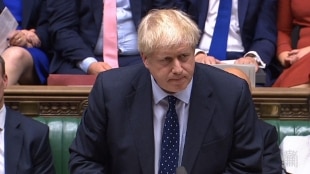- Brexit, it's hunting for votes. Boris Johnson to the 'Super Saturday'
- Brexit, the Johnson agreement and the one May: what changes?
- White smoke on Brexit, Juncker: "Agreement with London found"
Share
19 October 2019 The showdown has arrived for the British premier, Boris Johnson, who today in Westminster faces the vote of the new agreement reached in extremis with the EU on Brexit. It is the 'super Saturday': it had not happened since 1982 - at the time there was a war in the Falklands by Margaret Thatcher that held the seat - that Parliament did not meet on Saturday.After last night's appeal - "there is no better agreement than the one reached" - Johnson goes back to the parliamentarians in a speech, the debate will follow while the vote is expected between mid-afternoon and early evening, everything will depend on what amendments the speaker John Bercow will admit.
The head of the British government does not have the majority on paper, as instead the Letwin amendment, which emerged in the last hours, could delay the approval of the agreement. Johnson appeals to all the political forces of the House of Commons to give the green light.
The goal of the Tory government remains to go out on October 31 but the path continues to be bumpy and despite the heralded declarations of trust, the numbers are uncertain. According to the latest count of the BBC, there are 302 favorable (including 272 Tory and 9 Labor) and 301 against (218 Labor, together with Lib-Dem, Scots, Dup, other independent and minor parties) with 36 undecided: a struggle last vote to win the 320 needed. Against the agreement have already lined up the Dup, Northern Irish unionist party (which was against the backstop and remains also contrary to the new arrangement reached in the updated agreement), the Scottish nationalists of the SNP, the Labor party and the Lib-Dem. Two groups that could make the difference, one way or the other: the so-called 'Spartans', bitter Brexiteers who last time rejected Theresa May's plan, burying it (some have already said that this time they will support the premier's plan ); and the 'rebels' of the Labor party, pro-Leave, who despite the indications of leader Jeremy Corbyn could decide to support the new BoJo agreement. Among these, Caroline Flint, Stephen Kinnock and Melanie Onn.
To complicate the day there are the amendments presented, from the one that aims to link the agreement to a second referendum to the one that aims to keep the no-deal option alive even after the end of the transition period. But above all there is the amendment signed by Oliver Letwin, former Tory rebel expelled from the conservative party last month after voting against the government, along with Hilary Benn and others: this requires that the full approval of the Brexit agreement does not it occurs until all associated legislation is approved, even after October 31st.
A motion that aims to prevent the Brexiteer hawks from approving the agreement, thus removing the conditions for the application of the Benn Act (the anti-no-deal law approved last month), and then rejecting the following exit law from the EU, thus forcing the country to a Brexit on October 31 without agreement.

